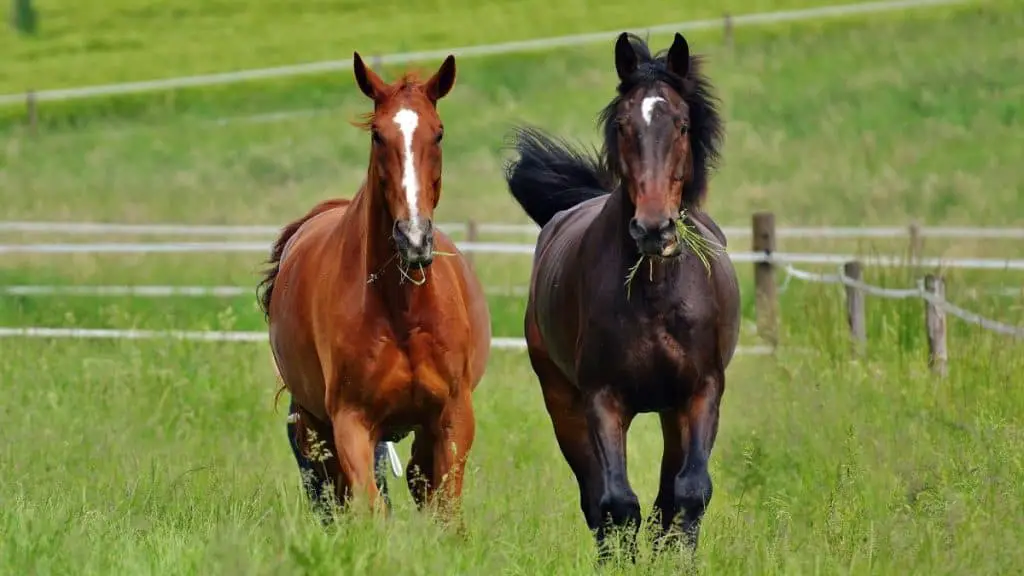Skip To Section
Everyone knows that hay is for horses, but do horses eat grass? Put it this way: if horses had a food pyramid, the base would be grass. The modern horse and its equine cousins are herbivores that evolved to get most of their nutritional needs from grass.
But not all grass is suitable for horses, and not all horses survive well on just grass alone in the modern world. This article examines the place of grass in the horse’s diet, from its benefits to its flaws and everything in between.

The Difference Between Grass And Hay
Before we get started, it’s important to note that there is a difference between grass and hay. The term hay refers to a process of cutting and drying long-stemmed grasses or legume species. As such, not all hay is grass.
Grass does not require special preparation for a wild horse to eat; they simply rip the long stems out of the ground, grind them up beneath their hooves, and mow down. However, hay must be produced and processed by human hands before horses consume it.
What Kind Of Grasses Can Horses Eat?
Now that we know the difference between hay and grass, we can examine the types of grass horses can eat, either in raw or hay form.
You’ll find different grasses thrive in different seasons and locations. Generally, local grass grows best in your pasture, but you can also add various grasses or legumes to the pasture for nutritional variety.
1. Kentucky Bluegrass
Horses of all ages and breeding like to eat Kentucky Bluegrass. It tolerates drought well, survives in sandy or clay-based soil, and grows quickly, making it a favorite of horse owners. However, it does require fertilizer maintenance, so keep that in mind when planting.
2. Perennial Ryegrass
Ryegrass is a growing powerhouse horse owners often used for forage. It tolerates overgrazing and rebounds quickly from drought. However, it can cause laminitis, a condition that deteriorates the equine foot.
3. Bermuda Grass
Bermuda grass produces well in rich soil and provides excellent nutrition for pastured horses. It doesn’t thrive in colder climates but can grow in areas with warm summers with adequate care.
4. Crabgrass
Yes, horses can eat the otherwise annoying eyesore of crabgrass! However, it’s not the most nutritionally dense grass, and it can take over areas of better quality grass when left unchecked.
5. Tall Fescue
The king of grass, Tall Fescue thrives in low pH soil and withstands drought thanks to its deep roots. This grass provides quality nutrition throughout most of the year.
6. Timothy Grass
Timothy grass grows well in cooler climates with lots of moisture. It’s excellent for forage but does not tolerate overgrazing well and requires some annual TLC for longevity.
7. Quackgrass
Quackgrass produces fast and survives droughts and low pH soil. It pairs well with legumes for nutritional quality during dry or harsher seasons.
Is Lawn Grass Bad For Horses?
Lawn grass does not provide the nutrition horses need to thrive. In fact, in some cases, lawn grass can be detrimental to a horse, especially when previously treated with pesticides or other chemicals.
However, lawn grass is not inherently bad for horses. It’s just not great for them, either. Properly dried lawn grass can serve as a snack for horses, but nutritionally speaking, it’s worth nothing more than a tick tack or mints might be to a human.
Is Fresh Cut Grass Good For Horses?
Fresh grass clippings pose a significant threat to all horses. A horse looks at freshly cut grass the same way humans look at a bag of potato chips or a chocolate cake – the whole batch gets gobbled up in one go, and the body pays for it later.
Horses graze slowly, and this lengthy eating process is how their digestive system safely processes food. However, when a horse starts eating freshly cut grass, all slowness goes out the window, and a horse may find itself swallowing large clumps of poorly chewed grass.
Freshly cut grass is prone to bacterial invasion and mold growth and often leads to health problems for the horse. Bottom line, if you want to feed your horse grass trimmings, dry it out first before letting your horse chow down.
What Grass Is Bad For Horses?
Several types of grass are unsafe for horses to consume.
1. Sorghum Grass (Johnsongrass, Sudan Grass, etc.)
Sorghum grasses are commonly used in dryer climates like New Mexico for grazing. They can be safe for horses when monitored closely, but research shows sorghum grasses pose risks to horses even in moderation.
Frequent and large amounts of consumption of sorghum grasses can cause cyanide poisoning or nitrate toxicity in horses. Therefore, the consumption of sorghum grass needs to be highly regulated.
2. Wet Grass
Wet grass is not a horse’s friend. Wet grass can ferment in a horse’s stomach.
A horse consuming wet grass can develop colic or other health issues, and there is no definition of what counts as “too wet” of grass.
3. Young Grass
Young grasses of Spring produce more water-soluble carbs that, when consumed, can cause the bacterial condition of laminitis in horses. Therefore, prevention consists of stopping grasses from going to seed and stop over-fertilization.
4. Fescue Toxicity
Fescue thrives in the central United States, and lawn enthusiasts love it for its disease and drought resistance. However, its hardiness comes from a fungus that grows in the grass and poses a health risk to horses.
Fescue can mess with a horse’s reproductive cycle and can extend pregnancy in mares. In many cases, fescue toxicity can stop milk production in mares. However, extreme toxicity can lead to death.
Can Grass Kill Horses?
Unfortunately, grass is a common cause of death in horses. In some cases, bacterial infections from wet, fermented grass lead to death. In others, toxicity from fescue or sorghum varieties is the culprit.
It’s important to know what grasses are in your pasture and keep an eye out for signs of illnesses and diseases commonly caused by grasses such as:
Colic
Caused by wet, moldy grass or overeating, colic consists primarily of stomach pains in horses and often manifests as lack of appetite, excessive sweating, constipation, and rolling or laying down as if uncomfortable.
Thankfully, when treated, colic is entirely recoverable. However, if left untreated, a horse can die from malnutrition. In addition, chronic infections are common, so don’t hesitate to call a veterinarian when you suspect colic.
Cyanide Poisoning
Chronic and acute cyanide poisoning stems from exposure to sorghum grasses. Signs of poisoning include drooling and an almond-scented breath, vomit, seizures, anxiety, muscle spasms, and weakness. Cyanide poisoning requires immediate veterinarian treatment.
Fescue Toxicity
Most deaths from fescue toxicity are the result of nutritional deficiencies in foals or difficult labors in broodmares. Fescue toxicity can lead to extended pregnancies, meaning foals will grow larger and be harder for a broodmare to birth.
Fescue toxicity makes labor harder for mothers and stops milk production, often leading to health problems in the foal. In extreme cases, foals can die from lack of nutrition. In hard labor conditions, a mare may bleed out or die from exhaustion.
Can Horses Survive On Only Grass And Hay?
Whether or not a horse can survive solely on grass or hay depends on the horse and the pasture grass. By nature, horses should mainly consume grass and hay, but thanks to modern droughts, lack of good pasture, and overgrazing, not all pastures have adequate nutrition.
However, if pasture is well maintained, fertilized, and hosts quality grass, then yes, a horse can subsist solely on grass and hay. This varies with larger types of horses, and working horse breeds often require supplementation with oats and grains, primarily if used for racing or work.
If you are unsure of the quality of your pastureland, consider having the soil tested for pH and figure out what grasses and weeds grow or can grow on your land. A veterinarian or equine center can help you determine if the grass variety is safe and healthy for your horses.
What Grass Do Horses Like Best?
Horses will eat most grasses when hungry. However, they do show some preferences when given a choice. Kentucky bluegrass remains a popular choice for horses and their owners. Additionally, quackgrass and timothy grass varieties remain popular with horses as well.
In many cases, horses prefer to eat a mixture of legumes and grasses together. Alfalfa mixed with other grasses is an excellent balance for hay or pasture. Plenty of horses also enjoy fescue grass or ryegrass in moderation too.
Conclusion
The horse has evolved over thousands of years to thrive on grasses that we humans might consider weeds. So you could say that horses are one of nature’s original lawnmowers!
Keep in mind that not all grasses are safe or healthy for horses to eat. Therefore, it’s essential to supplement your horse’s diet when pasture conditions fail or for larger and working breed horses.
Grass and hay form the base of the horse diet. In nature, a horse will survive solely on grass alone when conditions allow. As such, it should come as no surprise that grass will prove to be a favorite meal for your horses.
Related Posts
- Can horses eat apples?
- Can horses eat bananas?
- Can horses eat celery?
- Can horses eat grapes?
- Can horses eat oranges?
- Can horses eat sweet potatoes?
- Can horses eat watermelon?
- What do horses eat?
- Can horses eat zoysia grass?
